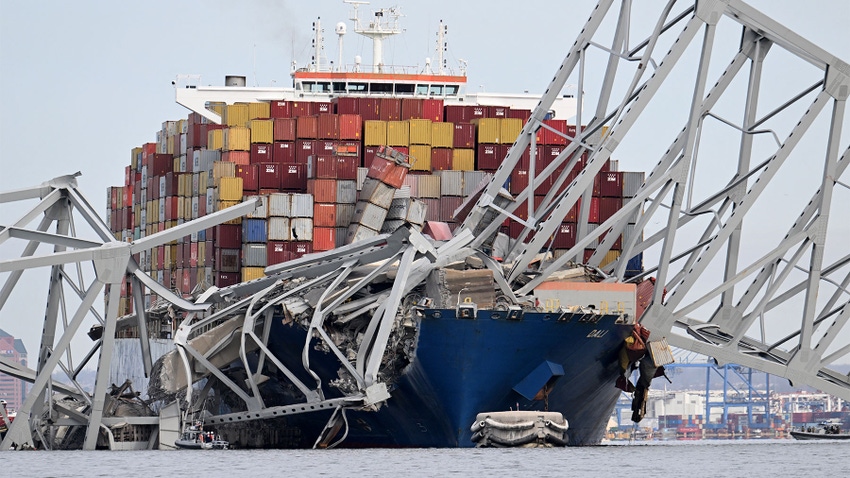
The tragedy surrounding the collapse of the Francis Scott Key Bridge in Baltimore continues to unfold.
Early Tuesday morning, a container ship plowed into one of the bridge’s columns, sending the steel superstructure into the cold Patapsco River below. Officials have stated that there is still a search-and-rescue effort ongoing and that they may be looking for up to seven people, but that number could change.
As a result, the Port of Baltimore, one of the Northeast’s busiest, is closed to shipping traffic until further notice, and it is likely that many ships will have to be diverted to neighboring ports up and down the East Coast. The website Marine Traffic shows at least a dozen ships with a destination of Baltimore waiting to get into port.
The impact on shipping traffic will no doubt be felt for weeks and months to come. For agriculture, the Port of Baltimore is the closest in proximity to the Midwest and is the largest U.S. port by volume for handling farm and construction machinery.
According to state data, the port handled a record 1.3 million tons of roll-on and roll-off farm and construction machinery in 2023. This includes tractors, combines, hay balers and more.
The Maryland state government website states the port’s private and public terminals handled 847,158 autos and light trucks in 2023, the most of any U.S. port for the 13th straight year.
The top five agricultural products that are imported and exported from the Port of Baltimore are:
sugar
soybeans
grain (corn and wheat)
coffee
grocery items
But it’s a relatively small player in this area, at least compared to much larger ports like New Orleans, on the mouth of the Mississippi River, which handled more than 40 million metric tons of soybeans in 2021, according to data from USDA Agricultural Marketing Service.
Mike Steenhoek, executive director of the Soy Transportation Coalition, wrote in an email this morning that while the port is not a significant port region for soybeans and grain, it is a significant resource for the broader economy.
“It also underscores the reality that while our oceans are vast and expansive, the ports that serve as the origins and destinations for global commerce can be vulnerable, whether due to weather, accident or attack. Investing in, maintaining and securing these essential links in our national and global economy must remain a national priority,” he wrote.
Megan Tanel, president of the Association of Equipment Manufacturers, issued a statement later in the day:
“The Association of Equipment Manufacturers extends our deepest sympathies to the victims and their families of this devastating event in Baltimore this morning. The Port of Baltimore is a very important part of our industry’s ability to ship equipment and equipment components all over the world. While the impact of the bridge collapse on the off-road equipment manufacturing industries is of significant concern, it is too early to predict the impact currently. As an association, we stand ready to work with authorities and industry partners to address the challenges posed by this incident and ensure the continued resilience of the equipment industry.”
View the collision below:
About the Author(s)
You May Also Like






